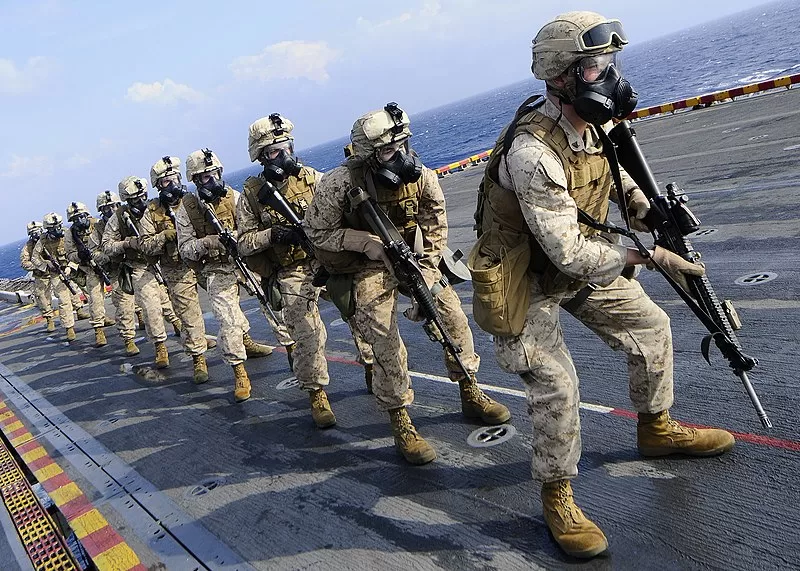The partnership between the United States Marine Corps and the Navy has a storied history, dating back to the inception of both branches. In times of peace and war, Marines aboard naval ships play a vital role in ensuring maritime security and projecting national strength. This blog post delves into the multifaceted duties of Marines stationed aboard naval vessels during peacetime and wartime, highlighting their unwavering commitment to safeguarding the nation’s interests at sea.
PEACETIME
Ship Security and Boarding Operations: Marines stationed on naval ships are responsible for shipboard security, ensuring that unauthorized personnel do not access sensitive areas. They are trained to execute boarding operations, inspecting vessels suspected of illicit activities and ensuring compliance with international laws.
Security of Strategic Assets Marines help protect critical assets and equipment on naval ships, safeguarding advanced technology, weaponry, and communication systems from potential threats.
Training and Readiness: During peacetime, Marines engage in continuous training exercises to maintain their combat readiness. This includes honing their marksmanship skills, conducting search and rescue drills, and rehearsing response protocols for various contingencies.
Humanitarian Assistance and Disaster Relief (HADR): In addition to their combat roles, Marines play a crucial part in humanitarian missions, providing aid and relief during natural disasters or other humanitarian crises. Their ability to quickly deploy from naval vessels can make a significant difference in affected regions.
Diplomatic Missions: Marines often participate in diplomatic efforts, serving as a visible representation of U.S. interests during port visits and international engagements.
WARTIME
Amphibious Assaults: In times of conflict, Marines play a central role in amphibious assault operations. They utilize naval ships to reach enemy-held shores, using specialized landing craft and equipment to establish beachheads and secure strategic locations.
Ship Defense: Marines contribute to ship defense against air, surface, and submarine threats. They operate advanced weaponry systems and provide critical situational awareness to the ship’s crew.
Security and Force Protection: During wartime, the risk of hostile actions increases. Marines intensify shipboard security, ensuring the vessel remains operational and its crew safe from potential infiltrations.
Tactical Coordination: Marines work alongside naval personnel to execute tactical maneuvers, coordinating efforts to defend the ship and carry out offensive operations against enemy forces.
Support for Special Operations: Marines often collaborate with Navy SEALs and other special operations units, utilizing their unique capabilities to conduct covert operations, reconnaissance, and direct-action missions.
Conclusion
Marines stationed aboard naval ships form an essential component of the Navy-Marine Corps team, exemplifying adaptability and versatility in peacetime and wartime scenarios. Their roles encompass ship security, humanitarian assistance, combat readiness, amphibious assaults, ship defense, and more. Regardless of the situation, Marines’ dedication to duty remains unwavering as they defend the nation’s interests at sea. Their contributions uphold a legacy of strength, resilience, and commitment that continues to be a cornerstone of maritime security.

 Our legacy lives through the stories we tell. The Suck Life wants yours! Make Chesty proud!
Our legacy lives through the stories we tell. The Suck Life wants yours! Make Chesty proud!



 Semper Fidelis
Semper Fidelis



